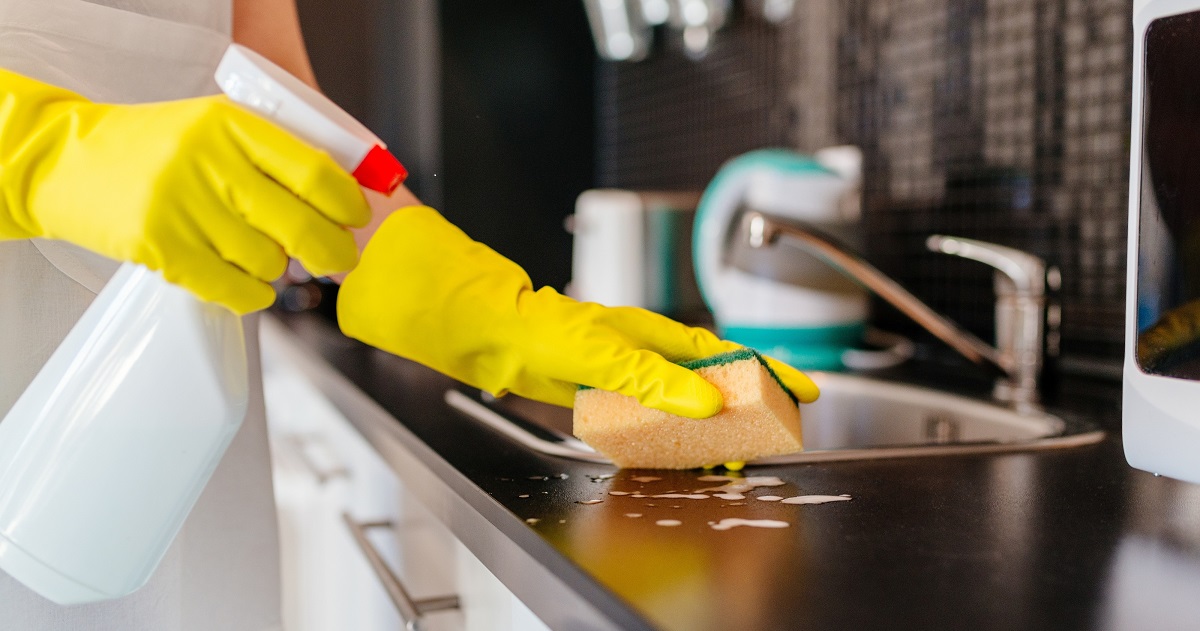As busy parents, there is one household chore that is almost universally unpopular – cleaning our homes. With the current COVID-19 situation keeping homes spotless and germ-free has become even more important. As lockdown eases many of us may be thinking of employing a cleaner to help out, but with so many options available, what should you be considering when making your choice? We spoke to Alison Da Costa, a director at cleaning company St Giles London Ltd to get some tips and pointers.
If you are already considering recruiting a regular cleaner we recommend asking yourself if you need to get your home thoroughly deep cleaned before the new cleaner even starts. The advantage of having a full deep clean first is your home will be spotless and germ-free, making it easier for your cleaner to maintain that high standard when they do come on board. Deep cleaning usually includes extras like a full degrease oven clean; descaling showers and toilets; wiping down all doors, door handles, sockets and light switches with specialist antiviral products; cleaning high-level lighting and much more – items not usually included in light domestic cleaning duties.
When it comes to recruiting a cleaner typically there are three sources for staff used by most people: going direct to a cleaning company, using an agency or recruiting directly either through advertising or word-of-mouth recommendations.

Going direct to a cleaning company
Finding your cleaner from a cleaning company, such as St Giles London Ltd, has several advantages.
- Cleaning companies employ their cleaners directly, know them personally, work with them on a daily basis and train them to high standards.
- Cleaners will have been fully checked for their right-to-work status, as required by law, and DBS checked if necessary.
- Most cleaning companies will take time to ensure the staff they send you are the right fit for you and your family. They know getting a good match between the client and the employee is the key to a successful, long-term working relationship.
- Cleaning companies will have the correct public and employee liability insurance. Always ask to see a copy.
The personal touch
Another advantage, which you may not get from all companies, but certainly will from St Giles, is the personal touch. When one of our employees first goes to your home they will be accompanied by a member of our management team. We introduce the cleaner to you, speak to you about your cleaning needs and set your priorities. If you do have any issues with your cleaner you can speak to a manager who has visited your home and understands exactly what your unique situation is.
Cover when your cleaner is absent
Cleaning companies will provide cover in the event your cleaner is absent, without you having to explain your requirements again.
Extra services, easy billing
Many cleaning companies provide additional useful services such as deep cleaning, window cleaning, ironing, oven cleaning or even gardening, with the convenience of only one bill per month.
The only disadvantage of using a cleaning company over an agency is more limited resources in terms of staff. A cleaning company may not cover your area or be able to provide you with a cleaner on the day and exact time you want. If using a cleaning company be prepared to be flexible about the day of the week and time you want your cleaning done.
Agency and Franchise Cleaners – the pros
By far the most visible method to find cleaners is using an agency to supply staff. A Google search of “cleaners near me” will throw up ads for dozens of agencies offering cleaners in your area. Most agencies operate in one of two ways; either as employment agencies placing self-employed individual cleaners for a fee, which can be one-off or on-going, or as franchises with the cleaners being franchisees working for an umbrella organisation. The main advantage of agencies and franchises is they tend to have large pools of cleaners to pull from so can place a cleaner with you quickly.
 Agency Cleaners – the cons
Agency Cleaners – the cons
- Cleaning agencies generally have little or no actual contact with their cleaners in terms of quality control, relying on client feedback
- Typically they won’t go out and check a cleaner’s work, nor will they train them.
- Agencies may ask you to pay the cleaner directly, by cash, every visit as well as invoicing you monthly.
- Is the cleaner covered by the agency’s insurance or their own? Either way, ask to see proof.
- If you have an issue with how your cleaner has performed, agencies are unlikely to address the issue specifically with that cleaner, but rather just offer you a replacement.
Franchisee Cleaners
With franchises the cleaner is usually self-employed, licensing the local franchise from the master franchisor. The pros include:
- Franchisors tend to exercise quality control over their franchisees, including regular training, monitoring of punctuality, and complaint-handling procedures.
- Cleaners will usually have been fully checked and will have company ID/uniform so you can be sure the person turning up is who they say they are.
The disadvantages of using franchise cleaners include not getting the same cleaner every week; standards can vary; if you have a complaint you may end up dealing with the franchisor team, rather than directly with the local franchisee business that did your work.
Recruiting your cleaner directly
Many people find their cleaners through recommendations from friends or through local advertisements. The main advantage of finding a cleaner this way is cost, as directly employed cleaners’ rates tend to be lower than those charged by an agency or cleaning company, however the gap in rates is closing. The disadvantages of hiring direct include:
- Unlikely to offer cover if the cleaner is ill or otherwise absent;
- May not have insurance or have been DBS checked;
- May ask for payment in cash which is both inconvenient and could potentially be aiding and abetting tax fraud if the cleaner is not declaring their earnings;
- You might be liable in the event the cleaner has an accident in your home;
- You might be classed as an employer by HMRC;
- You might be liable to pay maternity/paternity leave and sick pay.
Though employing a cleaner direct might appeal as it saves money, it can lead to a much bigger mess financially and legally that no cleaner would be able to sweep under the carpet!
My final tips to readers when selecting a cleaner are:
- Consider carefully how much time you think your cleaner will need to achieve what you want. People often underestimate the amount of time required to clean their homes properly. If you think you need a couple of hours, in reality you probably need three hours at least. This is because professional cleaners work to high standards and clean things most of us don’t generally bother with when we do a quick clean at home. It is always worth discussing with your cleaner before they start what your main priorities are.
- Try out your cleaner before you commit – agree to do a test session (which you may need to pay for at a slightly higher rate) before hiring your cleaner.
Alison Da Costa is a director at St Giles London Ltd (www.saintgileslondon.co.uk) and has been involved in running cleaning companies for over ten years.





